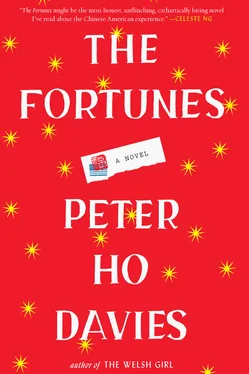The other member of their household was a surly young woman who told him to call her Little Sister, though she seemed two or three years his senior. “Or I could call you Little Brother,” she offered pertly, seeing his hesitation. He blushed at the slang for penis. “Pleased to meet you,” he said, and she smiled thinly. Her hair was parted in the middle, swooping down over her ears in two glossy black wings after the Tanka fashion, but when he asked, Haam-sui-mui? she grimaced.
“They call us ‘soiled doves’ here.” Not Tanka then, by her accent, which was the same as Ng’s, but at least her profession was familiar.
“Half the laundries are brothels,” Ng explained cheerily. “Good business! There’s a dozen fellows to every woman in the state.” Ling thought of the ship he’d arrived on, packed so tightly with men they shared their bunks — three tiers, eighteen inches between — in shifts. He’d heard one sailor joke, Add some oil and they’d be sardines. And yet his abiding memory of his passage was of loneliness, despite (or perhaps because of) the cramped quarters, shunned as he was by many of the other sojourners for being Tanka. In San Francisco, though, surrounded by ghosts, he’d felt the disembarking crowd of Chinese draw tight together, himself among them, Han and Tanka, Cantonese, Hakka and Hoklo all as one.
Little Sister slept past noon, but when she emerged on Ling’s first day, Ng set her to teaching him the “ eight-pound living” —ironing — which she consented to, grumpily.
“You?” Ling asked, surprised.
“Who you think had your job first?” she snapped, winding her hair into a tight bun and securing it with a chopstick.
“Then why not just get another girl?”
“Girls are expensive. You’re cheap!” The mannish jaw that clenched gave her face a sullen cast, unhinged into a wide, wanton grin when she laughed.
“Very funny.”
Her face closed, and she went back to lining up the flatirons on the stove, hefting them one at a time to spit on their shiny surfaces until the saliva skittered on the hot metal and she was ready to apply it to the shirt stretched out across the board before her.
“You see?”
He nodded.
She pressed the iron back and forth firmly, shoving the wrinkles along like waves until they fell off the edge of the board.
“See, lah?”
He nodded again.
She took a dainty sip from the bamboo beaker at her side and blew a fine spray of water onto the cloth before her, the iron sweeping over it with a little sigh of steam.
“I thought we were supposed to clean them,” Ling joked, but she ignored him, directed another jet of water at a stubborn crease. He caught a pink flicker of tongue between her teeth.
She moved forcefully but gracefully in her loose clothes, with a slight swinging rhythm that carried from her wrist to her hips and down to her dainty feet. She had rolled back her wide sleeve and he could see the sinews in her forearm — as taut as a man’s — rolling under the skin. When he looked up she was staring at him, and the next time she spat with greater vehemence. She made the work look easy, handling the hot irons so nimbly that they seemed to glide over the clothes, her body behind them swaying and fluid.
He would never have imagined that someone could iron lewdly, and yet he couldn’t help as he watched her thinking how else she used those hips, those forearm muscles, that mouth.
“Your turn,” she said, clanking her iron back on the stove.
The irons were heavier and hotter than he’d thought watching her — he cried out when he grazed his knuckles on a plate, stuffed them in his mouth to suck; she held out a rag for him to bind around his hand — and within minutes he was sweating, the drops dripping down his nose onto the linen, where he erased them with the hot iron, embarrassed to seem weaker than her. She had taken up a needle and thread.
“Too slow!” she scolded, without seeming to look up from her stitching. “Keep moving or the shirt will scorch.”
He felt his cheeks burning, heated with the work and the shame of it. Women’s work; but surely that should make it beneath him, not beyond him. When he paused to take a gulp of water, she shook her head. “You’re supposed to spit.” But when he tried the water just dribbled down his chin, or erupted from his mouth, not as a spray but as if he’d thrown up.
Wiping his chin, he thought he caught a smile on her face, but a moment later it was gone, like a wrinkle pressed away, her face smoothly indifferent.
“Here!”
She bit off the thread she was sewing, took the iron from him, and set to work again, drawing in a mouthful of water and expelling it with a little puff.
“How do you do that?”
“What? This?” And this time she hit him squarely between the eyes.
“Ai-ya!” He wiped his face on his sleeve. When he was done he found her standing on tiptoes before him, mouth open for him to study her tongue, her lips. He examined how she pursed them, the lithe curl of her tongue between them, and rehearsed the same motion tentatively inside his own mouth, all the time aware of her warm breath on his face, moist and honeyed like steam off tea.
“Now you.” She dropped back onto her heels with a little thud.
He worked on until his arm and back ached, but with concentration, by the time the pile was done he was able to direct a spurt of water in the approximate direction he intended. He looked over at her, but she was lying back among the dry clothes, eyes shut, asleep he thought, though when he flopped down beside her she leapt up at once.
“What are you doing?” she demanded.
“I’m finished.”
“Finished?” She pointed to the clothes all around them. “There’s no finished.”
He unwound the strip of cloth from his hand, clawed from gripping the iron, and massaged his fingers. “But I’m tired.” His palm smelled sourly of metal.
In answer she pointed to the ceiling, where among the rough beams he saw a metal hook gleaming dully.
“That’s for when you’re tired.” It took him a moment to understand; he’d been studying the faint spray of freckles across her cheeks. He’d heard of scholars tying their queues to such hooks, so that if they fell asleep over their books they’d be jerked awake. Uncle Ng must have heard the same story.
“Aren’t you going to help?” he asked.
“You need the practice. Besides,” she said, closing her eyes again, “I earn my keep.”
He had thought they were becoming friends, but when Ng returned and asked about his progress she gave a scathing report of him — lazy and weak, a shirker. He felt betrayed, leapt to his own defense. “See,” the old man cried. “He’s a good boy.” And then he struck her across the face. “You teach him better.” Ling took a step back, but the girl stood fast, one cheek white, the freckles stark as a constellation, the other flushed red, freckles vanished as if struck off by the blow, until Ng dismissed her. “Go do your work.”
She entertained each evening in a narrow lean-to adjoining the laundry, a door with a shutter in it — closed if she was engaged, open for viewing if she was available — leading to the alley alongside. Ling slipped out back late that night after Ng had headed off to his regular appointment at a gambling den and approached it, his mouth dry. He meant to apologize for getting her in trouble. The wicket was open, a smoldering square of lamplight in the gloom. After a glance up and down the alley he crept forward and peered in. She was sitting on the side of her bed in a white shift — silk, from the ivory glow of it, and so finely embroidered he knew she must have “borrowed” it from a customer. The walls around her had been papered at some point with old newspapers for insulation, the indecipherable headlines surrounding her. She was still sewing, making alterations and repairs to cleaned clothes during the lull between customers, hunching low over the work — her hair untied, swinging forward like a dark curtain around her face to meet the swoop of her needle — as if to make it out in the greasy light. He could see the ridges of her backbone through the thin cover of the gown, and then she cried out softly and put her finger to her mouth. In doing so she glanced over at the shutter, her face accusatory as if he’d made her do it, and he fled.
Читать дальше












